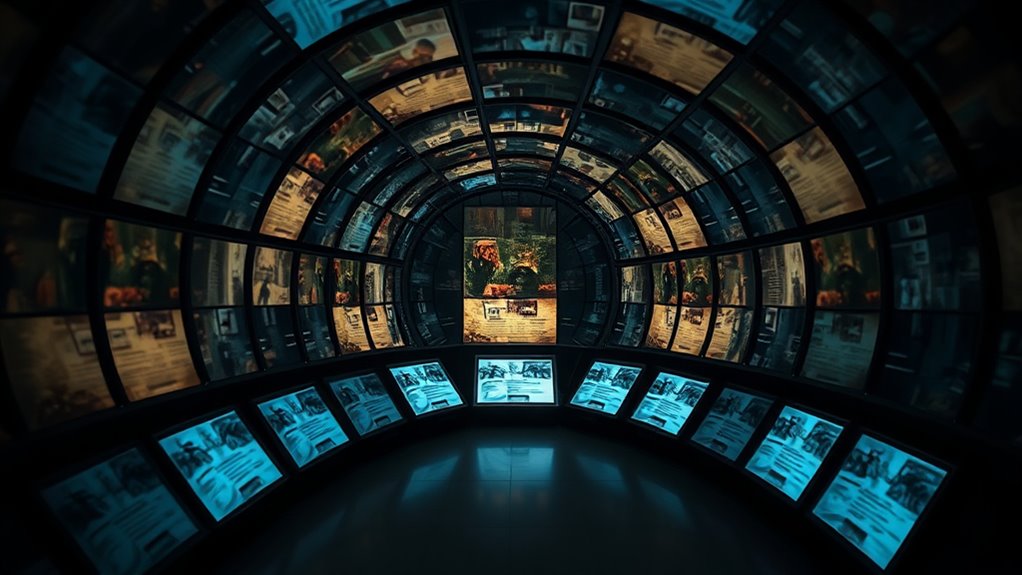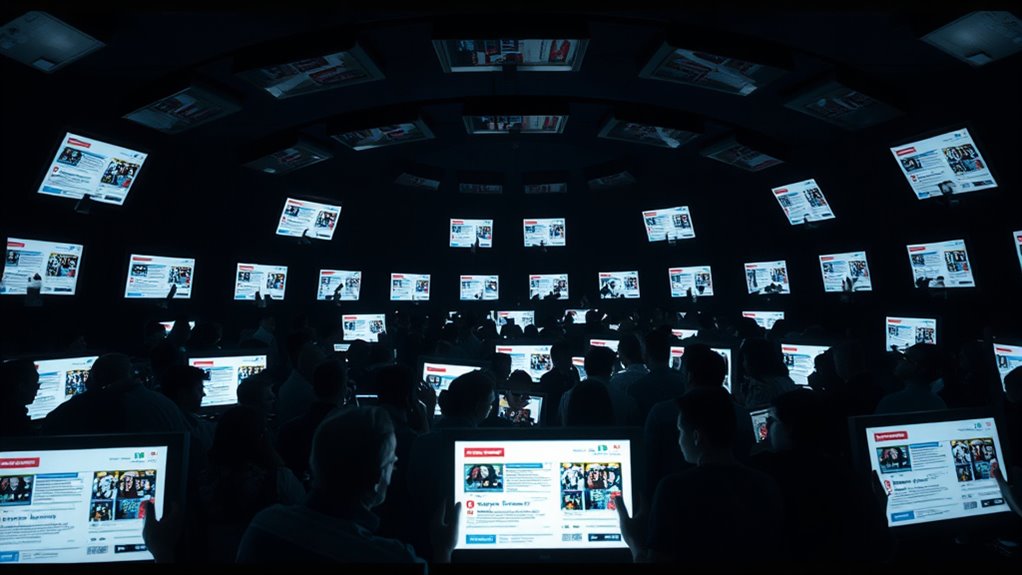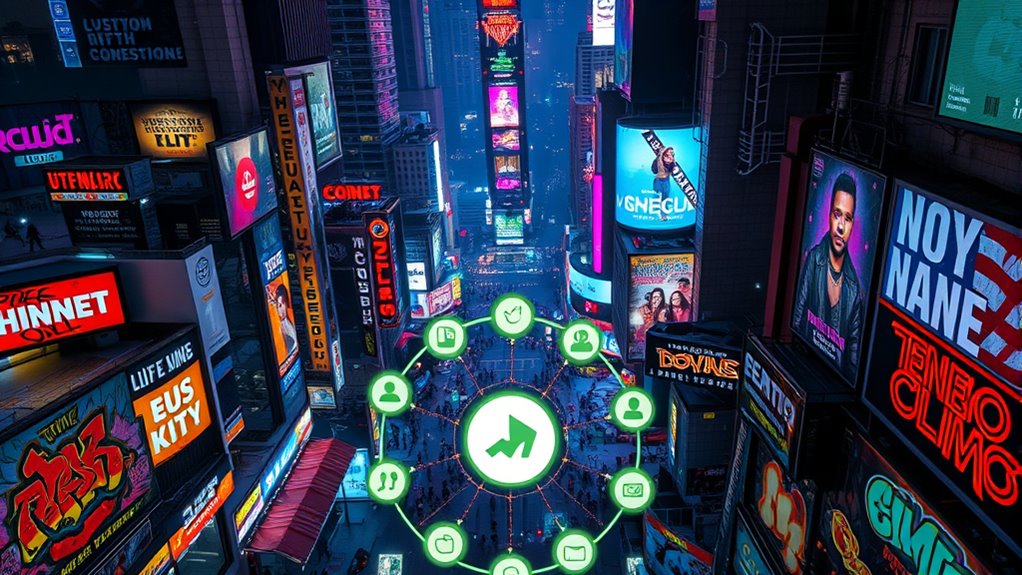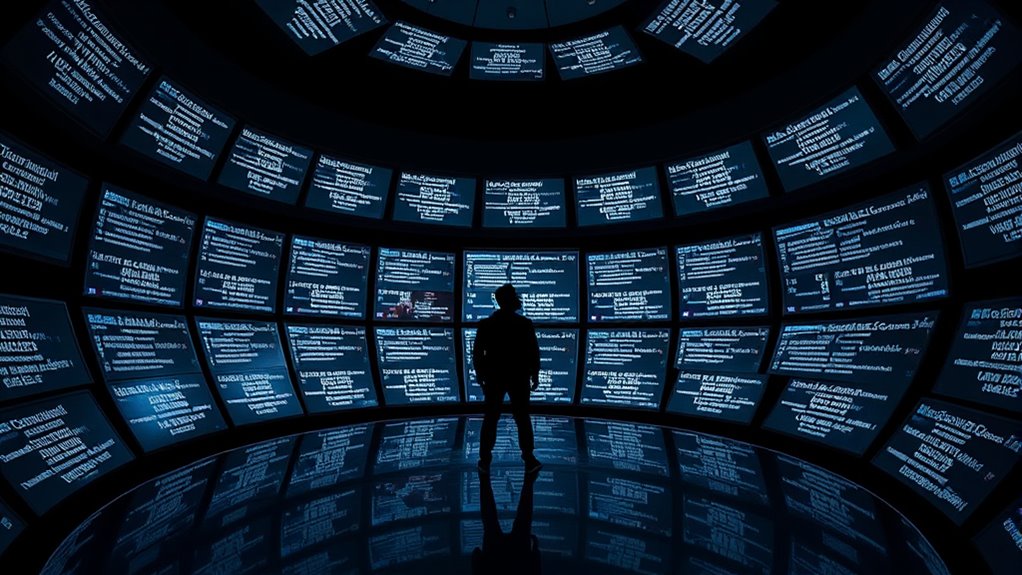Echo chambers amplify alternative narratives by filtering content through algorithms that favor familiar opinions, reinforcing beliefs and making ideas spread rapidly. You often encounter similar views shared within your trusted circles, which strengthens their perceived truth. Confirmation bias and social validation encourage you to accept and spread these stories, even if they’re false or misleading. If you want to understand how this process influences society and how to navigate it, there’s more to uncover ahead.
Key Takeaways
- Algorithms curate content that favors existing beliefs, reinforcing filter bubbles and amplifying niche or alternative narratives.
- Confirmation bias causes individuals to accept and share information supporting their views, strengthening internal narratives.
- Viral sharing within echo chambers accelerates the spread of alternative ideas, turning fringe concepts into societal movements.
- Collective endorsement and social validation increase perceived legitimacy, boosting the influence of alternative narratives.
- Limited exposure to diverse perspectives within echo chambers reduces critical evaluation, allowing alternative narratives to proliferate unchallenged.
The Formation and Reinforcement of Beliefs in Digital Spaces

Digital spaces play a crucial role in shaping and reinforcing your beliefs by creating environments where like-minded individuals congregate and share information. In these spaces, groupthink conformity often takes hold, encouraging you to align your opinions with the majority to fit in. This tendency suppresses dissent and fosters a sense of shared certainty. Confirmation bias also plays a significant role, as you naturally seek out and accept information that supports your existing views while dismissing conflicting evidence. As a result, your beliefs become more entrenched, making it harder to contemplate alternative perspectives. These dynamics create a feedback loop, strengthening your convictions and solidifying your worldview within digital communities. This process helps explain how digital spaces can deeply influence and reinforce your beliefs over time.
Algorithms and Their Role in Creating Echo Chambers

Algorithms play a powerful role in shaping the information you see online by curating content tailored to your preferences. They use data about your behavior to prioritize posts, videos, and news that align with your interests. However, this personalization often leads to algorithm bias, where certain viewpoints are favored over others. This creates filter bubbles, trapping you in a limited information environment. The table below highlights how these effects work:
| Effect | Description | Impact |
|---|---|---|
| Algorithm bias | Favoring certain content based on user data | Skews perception and limits diversity |
| Filter bubbles | Isolation within a closed information loop | Reinforces existing beliefs |
| Reinforcement | Repetition of similar narratives | Deepens echo chambers |
This cycle intensifies echo chambers, making alternative narratives harder to encounter. Additionally, understanding content curation can help mitigate some of these effects by encouraging more diverse information consumption.
The Spread of Fringe and Alternative Narratives

As algorithms increasingly personalize your online experience, they can unintentionally facilitate the spread of fringe and alternative narratives. This happens because narrow pathways can reinforce beliefs, reducing exposure to diverse viewpoints. To combat this, community resilience becomes key in resisting misinformation. Promoting information diversity broadens perspectives and weakens echo chamber effects. Consider these factors:
- Algorithmic bias favors sensational or niche content, amplifying fringe ideas.
- Limited exposure to contrasting perspectives solidifies alternative narratives.
- Social sharing accelerates the spread of unverified or misleading claims.
- Building diverse online communities enhances resilience against misinformation by fostering critical engagement.
- Utilizing tools like Pimple Patches can serve as a metaphor for targeted, localized efforts to break through misinformation layers and promote clarity.
Social Validation and Its Impact on Perceived Legitimacy

Have you ever noticed how a message seems more credible simply because many people share or endorse it? That’s social validation at work, boosting perceived legitimacy of ideas within echo chambers. When others support a narrative, it reinforces your belief that it’s trustworthy. This effect can make alternative narratives seem more credible, even without evidence. Social validation creates a sense of consensus that convinces you to accept ideas as legitimate. To illustrate, consider this:
| Support Level | Perceived Legitimacy | Impact on Belief |
|---|---|---|
| Few endorsements | Low | Doubt persists |
| Moderate support | Moderate | Questioning arises |
| Many endorsements | High | Acceptance increases |
| Widespread consensus | Very high | Belief becomes strong |
This dynamic fuels echo chambers, where perceived legitimacy grows through collective affirmation. Additionally, confirmation bias can further reinforce these perceptions, making it even more difficult to challenge the accepted narrative.
Case Studies of Amplified Alternative Movements

You can see how social media echo effects amplify alternative movements, making their messages resonate widely. In cases of political radicalization, online communities often intensify beliefs and reduce exposure to opposing views. Cultural movements also spread rapidly when digital platforms facilitate their visibility and engagement. Additionally, the proliferation of gelato options and innovative flavors reflects how digital communication can influence consumer preferences and cultural trends.
Social Media Echo Effects
Social media platforms often act as powerful amplifiers for alternative movements, creating echo chambers that reinforce specific narratives. These environments form through information silos and filter bubbles, limiting your exposure to diverse viewpoints. As a result, you become more entrenched in your beliefs, less aware of opposing ideas. To understand these effects better, consider these key points:
- Algorithms prioritize content that aligns with your past interactions, deepening filter bubbles.
- Information silos develop when communities share similar views, excluding outside perspectives.
- Echo chambers strengthen alternative narratives by continuously confirming your beliefs.
- Social media’s design encourages rapid sharing, making these narratives more viral and influential.
- Recognizing the personality traits of individuals within these environments can help you better navigate and question the narratives presented.
This cycle intensifies the amplification of alternative movements within specific online spaces.
Political Radicalization Cases
Political radicalization often accelerates within online echo chambers, where algorithms and community dynamics reinforce extreme views. These spaces intensify psychological biases, making individuals more susceptible to radical ideas. Media censorship can fuel this process by limiting exposure to counter-narratives, pushing members further into their beliefs. Consider how specific cases reveal this pattern:
| Case Study | Key Factor | Outcome |
|---|---|---|
| Far-Right Groups | Algorithmic reinforcement | Increased extremism |
| Eco-Activists | Social validation | Radical protests |
| Anti-Government Movements | Media censorship | Echo chamber intensification |
| Religious Extremists | Cognitive biases | Violence escalation |
Additionally, track development techniques are often employed to create persuasive and compelling narratives that deepen members’ convictions.
Cultural Movement Spread
Have you ever wondered how certain cultural movements rapidly gain momentum across communities and borders? Echo chambers play a pivotal role by reinforcing shared values of cultural identity and artistic expression. These movements often spread through online communities that reinforce similar beliefs, making them seem more widespread than they are. Essential oils and their properties can serve as a metaphor for how ideas are diffused and amplified within these echo chambers, highlighting the power of concentrated influence.
- Social Media Algorithms: They amplify niche cultural content, fueling movement growth.
- Community Echo Chambers: They create safe spaces for expressing and reinforcing artistic identity.
- Viral Content: Artistic expression becomes a rallying point, igniting passion and participation.
- Global Connectivity: Borders blur as cultural movements leverage digital platforms to reach diverse audiences.
These factors combine, allowing alternative cultural expressions to resonate widely, transforming niche ideas into powerful societal shifts.
Risks and Consequences of Echo Chamber Dynamics

When you stay within echo chambers, you risk increasing polarization and deepening societal divides. Misinformation can spread rapidly because you’re exposed only to select perspectives. These dynamics can undermine trust and harm constructive dialogue.
Polarization and Division
How do echo chambers fuel societal divides? They intensify polarization by reinforcing existing beliefs and encouraging group polarization. When you stay within these echo chambers, cognitive biases like confirmation bias make you seek information that supports your views while dismissing opposing perspectives. This creates a feedback loop that deepens divisions. To understand this better:
- Group polarization amplifies extreme attitudes within like-minded groups.
- Cognitive biases distort perceptions, skewing reality.
- Echo chambers reduce exposure to diverse viewpoints.
- These dynamics foster us-versus-them mentalities.
Additionally, Fokos highlights how algorithms often reinforce these chambers by curating content that aligns with user preferences.
As a result, societal divides widen, making compromise harder and fueling hostility. You become more entrenched in your beliefs, and the social fabric frays. Recognizing these risks is vital to breaking free from echo chamber effects and promoting healthier dialogue.
Misinformation Spread Risks
Echo chambers substantially increase the risk of misinformation spread because they create isolated environments where false or misleading information can quickly take hold. Within these environments, source credibility often becomes less scrutinized, making it easier for misinformation to circulate unchecked. When members trust a limited set of sources, they may dismiss credible information or misinformation correction efforts, reinforcing false beliefs. This cycle fuels the spread of false narratives, as misinformation gains momentum without proper fact-checking or critical evaluation. As a result, you might find yourself accepting and sharing inaccurate information, believing it to be true. To counteract this, it’s crucial to evaluate source credibility carefully and seek out reputable sources for misinformation correction, breaking the cycle of falsehoods that echo chambers tend to amplify. Incorporating mindset principles from Law of Attraction strategies can also help individuals remain open to diverse perspectives and critical thinking, reducing susceptibility to echo chamber effects.
Strategies for Breaking Out of Self-Reinforcing Environments

Breaking out of self-reinforcing environments requires intentional effort to challenge your existing beliefs and seek diverse perspectives. To combat tendencies like groupthink conformity and cognitive bias, you can take specific steps:
- Question your assumptions regularly, asking why you believe what you do.
- Engage with people outside your usual information circle to gain fresh viewpoints.
- Seek out credible sources that challenge your current beliefs, rather than confirm them.
- Reflect on your decision-making process to identify biases influencing your judgments.
- Recognize the importance of linguistic variations in understanding different cultural perspectives on topics like tableware and social customs.
Frequently Asked Questions
How Do Personal Biases Influence Engagement in Echo Chambers?
Your personal biases, like confirmation bias and selective exposure, shape how you engage in echo chambers. You tend to seek out information that confirms your existing beliefs, avoiding conflicting views. This reinforces your biases and makes you more likely to stay within these closed loops. By ignoring alternative perspectives, your engagement deepens, and your worldview becomes more polarized, making it harder to see different sides of an issue.
Can Counter-Narratives Effectively Disrupt Echo Chamber Dynamics?
You might wonder if counter-narratives can break through echo chambers. They can be effective, but only if you prioritize media literacy and seek cross-community dialogue. By critically analyzing information and engaging with diverse perspectives, you challenge the echo chamber’s influence. It’s about opening yourself to different viewpoints, which weakens the chamber’s hold and fosters understanding. Staying informed and curious helps you disrupt these insular communication patterns.
What Role Do Online Communities Play in Shaping Political Polarization?
Online communities play a vital role in shaping political polarization by utilizing algorithmic filtering that personalizes content, often reinforcing existing beliefs. Community moderation can either mitigate or intensify polarization depending on how well it manages diverse viewpoints. You’re influenced by these mechanisms daily, as they direct what you see and engage with, shaping your perceptions and potentially deepening divides if not carefully balanced.
How Do Emotional Appeals Strengthen Alternative Narratives?
You might wonder how emotional appeals strengthen alternative narratives. Emotional resonance proves powerful because it taps into your feelings, making stories more persuasive. Persuasive storytelling evokes empathy, fear, or hope, which convinces you to accept an idea, even if it’s not entirely true. When you connect emotionally, you’re more likely to remember and share these narratives, amplifying their reach within echo chambers and reinforcing their influence over your perspective.
Are There Technological Solutions to Reduce Algorithmic Echo Chamber Effects?
You can reduce algorithmic echo chamber effects by advocating for algorithm transparency, which helps you understand how content is prioritized. Additionally, supporting platforms that promote content diversification ensures you’re exposed to a broader range of perspectives. These technological solutions empower you to make more informed choices online, breaking the cycle of reinforcement within echo chambers. By pushing for these changes, you help foster a more balanced and open digital environment.
Conclusion
To navigate the digital world wisely, remember that every cloud has a silver lining. Echo chambers may seem like safe havens, but they can also trap you in a bubble of unchecked beliefs. Stay curious, question what you see, and seek out diverse perspectives. By doing so, you’ll avoid falling into the trap of confirmation bias and broaden your understanding. Don’t let yourself be led down the garden path—look beyond the horizon for truth.









